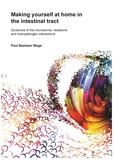Making yourself at home in the intestinal tract

Stege, Paul
- Promoter:
- Prof.dr R.J.L. (Rob) Willems
- Co-promoter:
- Dr F.L. (Fernanda) Paganelli
- Research group:
- Willems
- Date:
- November 9, 2022
- Time:
- 12:15 h
Summary
The human intestinal tract is densely colonized by bacteria, fungi, viruses and phages, that together form the gut microbiome. The results presented in this PhD thesis highlight the importance of the gut microbiome as a reservoir of potential opportunistic pathogens as well as of antibiotic resistance genes (ARGs) carried by the microbiome of both, humans and dogs. For this purpose, a probe-based capture system was implemented, called ResCap, to enrich for ARGs prior to sequencing. In addition, we used traditional shotgun metagenome sequencing and 16S rRNA profiling to determine bacterial microbiome diversity. Using this approach, we determined that the gut microbiome of humans from the general population contains bacteria that carry ARGs against several classes of antibiotics. While we did not find strong diet-induced associations with ARGs, we did observe diet-induced associations with particular members of the gut microbiome. In the case of the dog microbiome, we established that these are frequent carriers of ESBL-EC. ESBL-EC carriage was associated with several differentially abundant bacterial genera, including some opportunistic pathogens. ESBL-EC carriage was furthermore associated with an increased abundance of several ARGs. Since Enterococcus faecium was among the detected opportunistic pathogens and because it is clinically relevant for humans, we used a hospital isolate vancomycin resistant E. faecium strain to characterize its adaptive response during colonic epithelium colonization. This revealed that over the course of 24 hours, E. faecium rewires its transcriptome to adapt to this new environment. To validate these results, we developed an alternative method to generate knock-outs mutants using the developed CRISPR-Cas9 system, in order to substantiate the importance of some of these adaptations during colonization. More in-depth knowledge about the role of specific adaptive elements in gut colonization and/or intestinal overgrowth may provide new targets for new anti-infective therapies to curtail ecological dominance of E. faecium in the gut of hospitalized patients and prevent subsequent infections and clonal spread